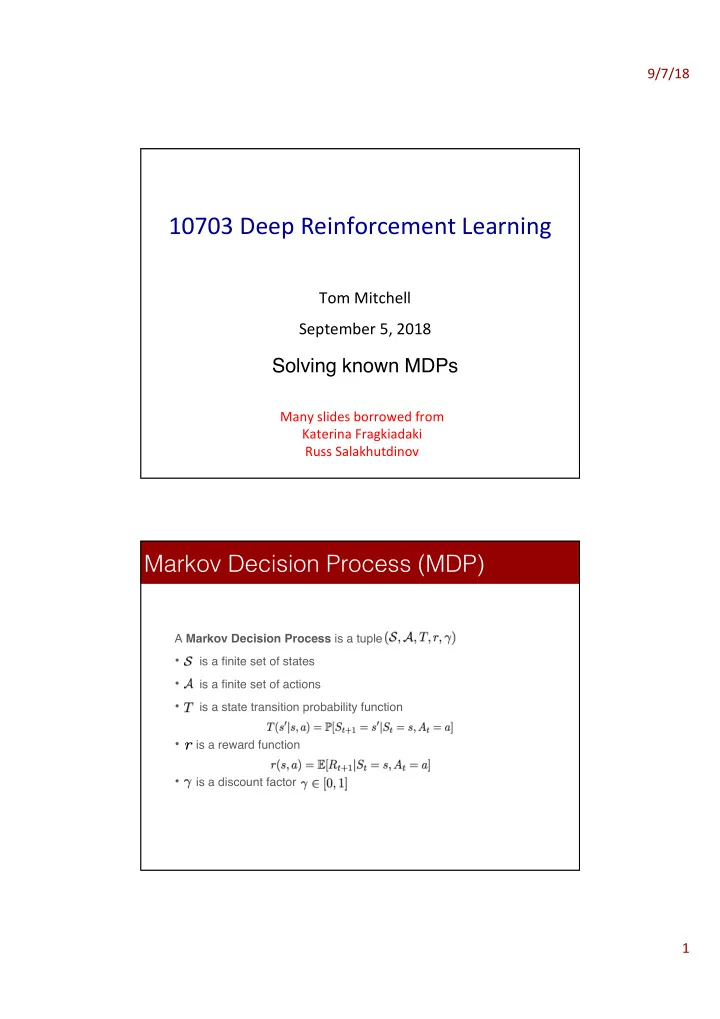

9/7/18 10703 Deep Reinforcement Learning Tom Mitchell September 5, 2018 Solving known MDPs Many slides borrowed from Katerina Fragkiadaki Russ Salakhutdinov Markov Decision Process (MDP) � A Markov Decision Process is a tuple • is a finite set of states • is a finite set of actions • is a state transition probability function • is a reward function • is a discount factor 1
9/7/18 Solving MDPs � • Prediction : Given an MDP and a policy predict the state and action value functions. • Optimal control : given an MDP , find the optimal policy (aka the planning/control problem). • Compare this to the learning problem with missing information about rewards/dynamics. • Today we still consider finite MDPs (finite and ) with known dynamics T and r . Outline � • Policy evaluation • Policy iteration • Value iteration • Asynchronous DP 2
9/7/18 First, a simple deterministic world… � Reinforcement Learning Task for Autonomous Agent � Execute actions in environment, observe results, and • Learn control policy π : S à A that maximizes from every state s ∈ S Example: Robot grid world, deterministic actions, policy, reward r(s,a) 3
9/7/18 Value Function – what are the V π (s) values? � Value Function – what are the V π (s) values? � 4
9/7/18 Value Function – what are the V * (s) values? � V*(s) is the value function for the optimal policy π * γ = 0.9 State values V*(s) for optimal policy 5
9/7/18 Question � How can agent who doesn’t know r(s,a), V*(s) or π *(s) learn them while randomly roaming and observing (and getting reborn after reaching G)? [deterministic actions, rewards, policy. A single non-negative reward state] Question � How can agent who doesn’t know r(s,a), V*(s) or π *(s) learn them while randomly roaming and observing (and getting reborn after reaching G)? [deterministic actions, rewards, policy. A single non-negative reward state] Hint: initialize estimate V(s)=0 for all s. After each transition, update: 6
9/7/18 Question � How can agent who doesn’t know r(s,a), V*(s) or π *(s) learn them while randomly roaming and observing (and getting reborn after reaching G)? [deterministic actions, rewards, policy. A single non-negative reward state] Hint: initialize estimate V(s)=0 for all s. After each transition, update: Question � Algorithm: initialize estimate V(s)=0 for all s. After each (s, a, r, s’) transition, update: True or false: • V(s) estimate will always be non-negative for all s? • V(s) estimate will always be less than or equal to 100 for all s? 7
9/7/18 Question � Algorithm: initialize estimate V(s)=0 for all s. After each (s, a, r, s’) transition, update: True or false: • V(s) estimate will always be non-negative for all s? • V(s) estimate will always be less than or equal to 100 for all s? • As number of random actions and rebirths grows, V(s) will converge from below to V*(s) for optimal policy π *(s)? Now, consider probabilistic actions, rewards, policies 8
9/7/18 Policy Evaluation � Policy evaluation : for a given policy , compute the state value function where is implicitly given by the Bellman equation a system of simultaneous equations. MDPs to MRPs � MDP under a fixed policy becomes Markov Reward Process (MRP) where 9
9/7/18 Back Up Diagram � MDP Back Up Diagram � MDP 10
9/7/18 Matrix Form � The Bellman expectation equation can be written concisely using the induced form: with direct solution of complexity here T π is an |S|x|S| matrix, whose (j,k) entry gives P(s k | s j , a= π (s j )) r π is an |S|-dim vector whose j th entry gives E[r | s j , a= π (s j ) ] v π is an |S|-dim vector whose j th entry gives V π (s j ) where |S| is the number of distinct states Iterative Methods: Recall the Bellman Equation � 11
9/7/18 Iterative Methods: Backup Operation � Given an expected value function at iteration k , we back up the expected value function at iteration k+1: Iterative Methods: Sweep � A sweep consists of applying the backup operation for all the states in Applying the back up operator iteratively 12
9/7/18 A Small-Grid World � R γ = 1 • An undiscounted episodic task • Nonterminal states: 1, 2, … , 14 • Terminal states: two, shown in shaded squares • Actions that would take the agent off the grid leave the state unchanged • Reward is -1 until the terminal state is reached Iterative Policy Evaluation � for the random policy Policy , an equiprobable random action • An undiscounted episodic task • Nonterminal states: 1, 2, … , 14 • Terminal states: two, shown in shaded squares • Actions that would take the agent off the grid leave the state unchanged • Reward is -1 until the terminal state is reached 13
9/7/18 Iterative Policy Evaluation � for the random policy Policy , an equiprobable random action • An undiscounted episodic task • Nonterminal states: 1, 2, … , 14 • Terminal states: two, shown in shaded squares • Actions that would take the agent off the grid leave the state unchanged • Reward is -1 until the terminal state is reached Iterative Policy Evaluation � for the random policy Policy , an equiprobable random action • An undiscounted episodic task • Nonterminal states: 1, 2, … , 14 • Terminal states: two, shown in shaded squares • Actions that would take the agent off the grid leave the state unchanged • Reward is -1 until the terminal state is reached 14
Recommend
More recommend